外研版英语八年级上册 Module 5 Unit 3 Language in use 课件(共32张PPT)
文档属性
| 名称 | 外研版英语八年级上册 Module 5 Unit 3 Language in use 课件(共32张PPT) |
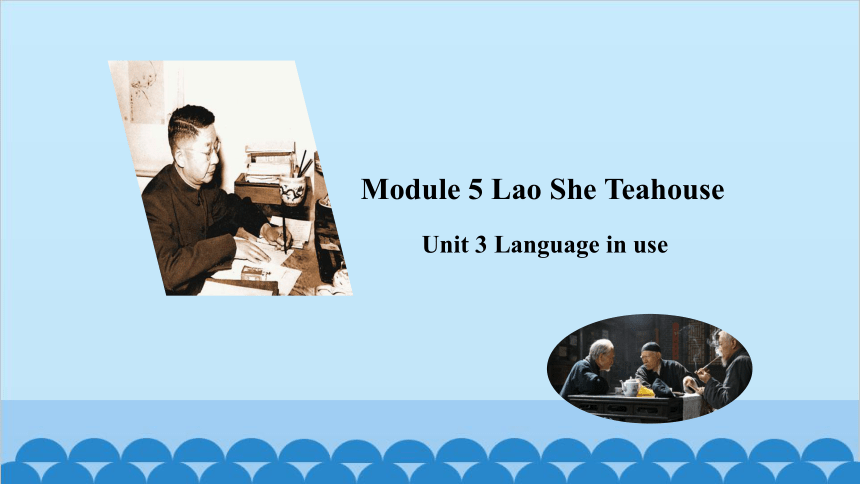
|
|
| 格式 | pptx | ||
| 文件大小 | 9.2MB | ||
| 资源类型 | 教案 | ||
| 版本资源 | 外研版 | ||
| 科目 | 英语 | ||
| 更新时间 | 2023-08-19 15:51:04 | ||
图片预览

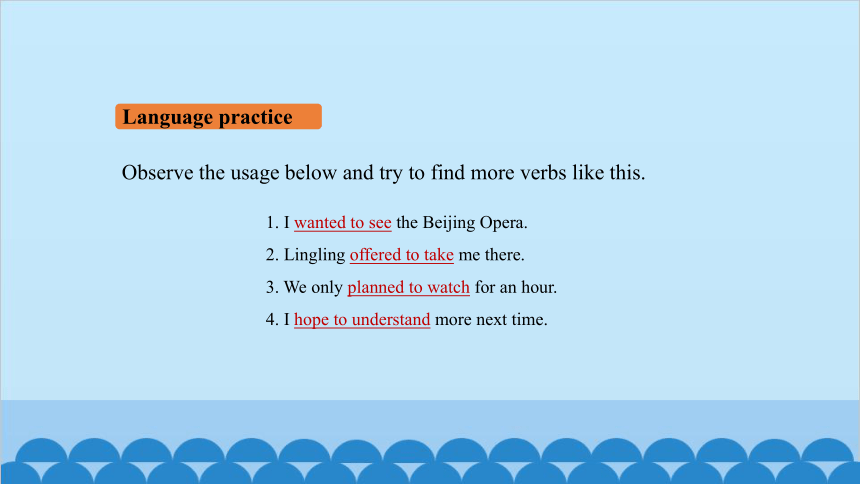
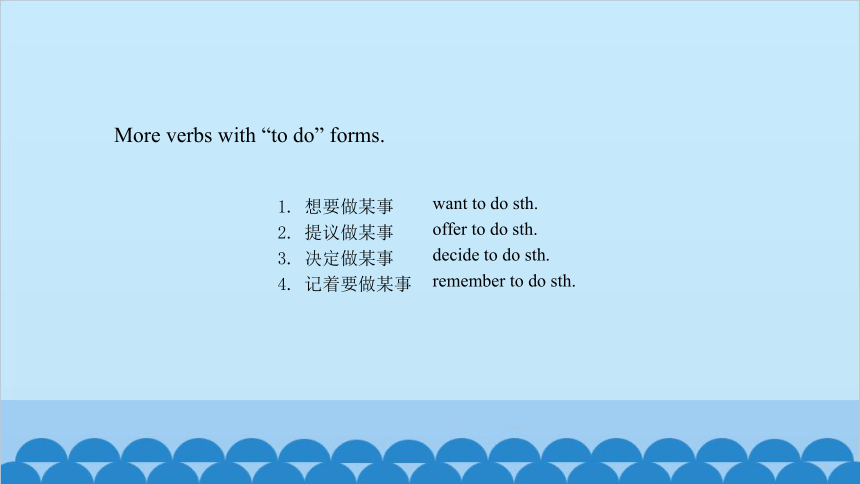
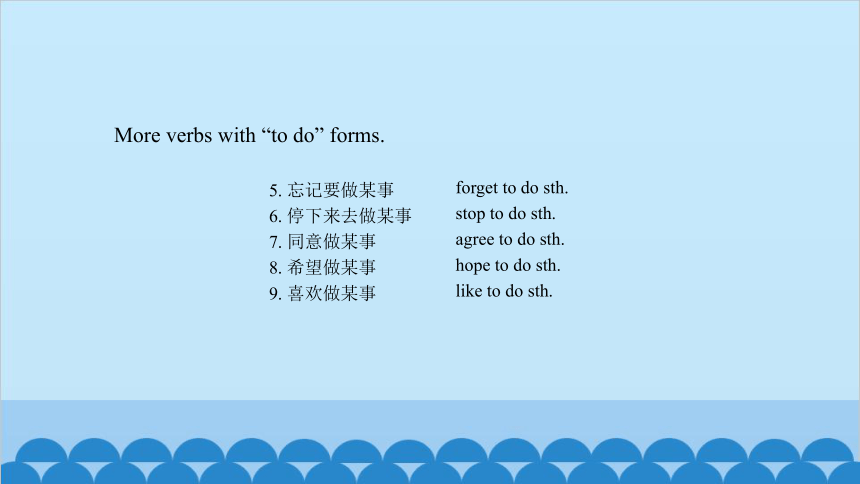
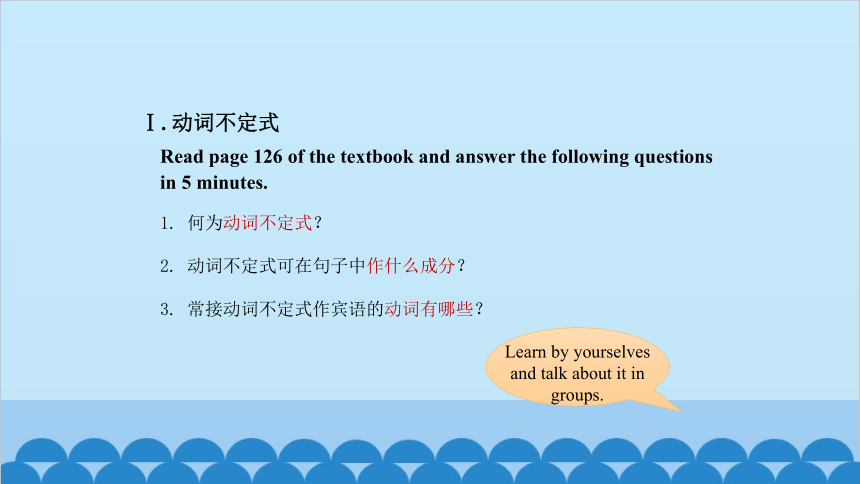
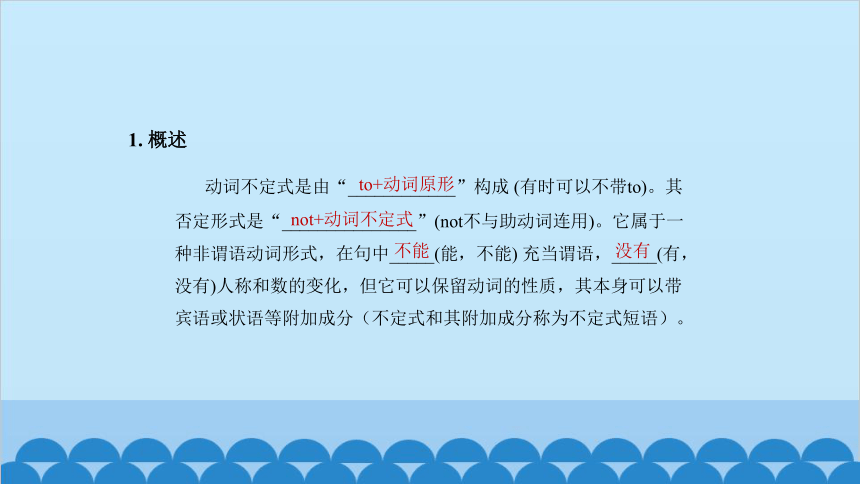
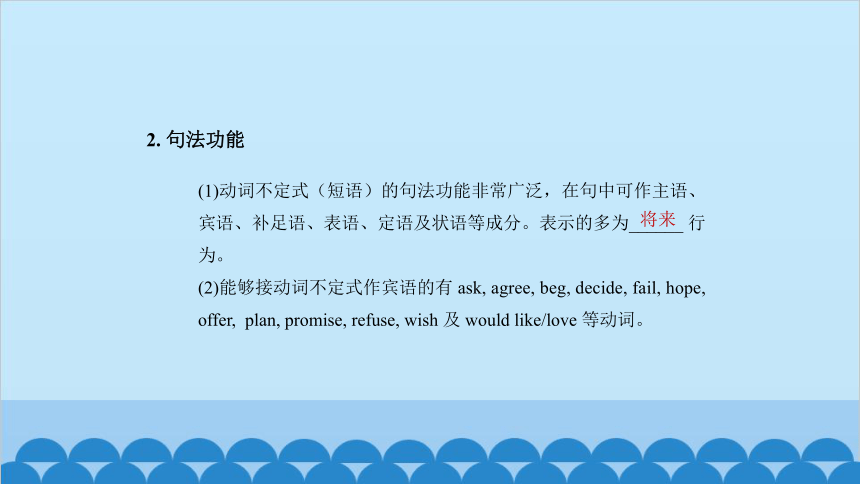
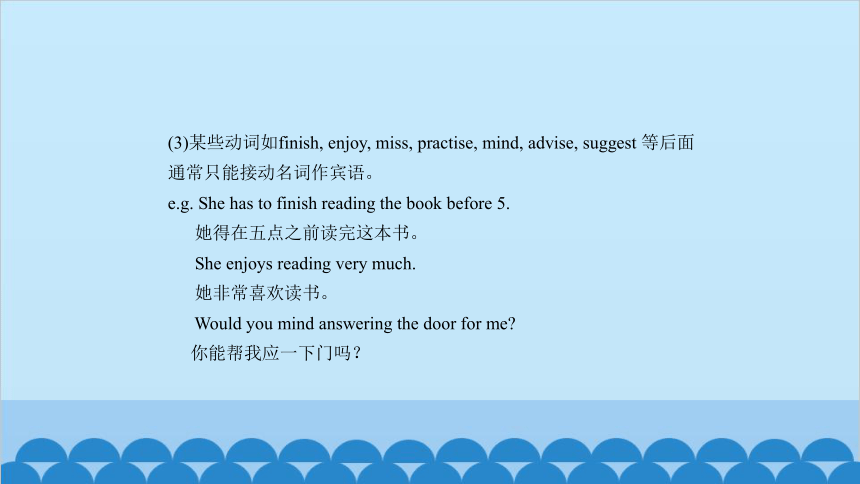
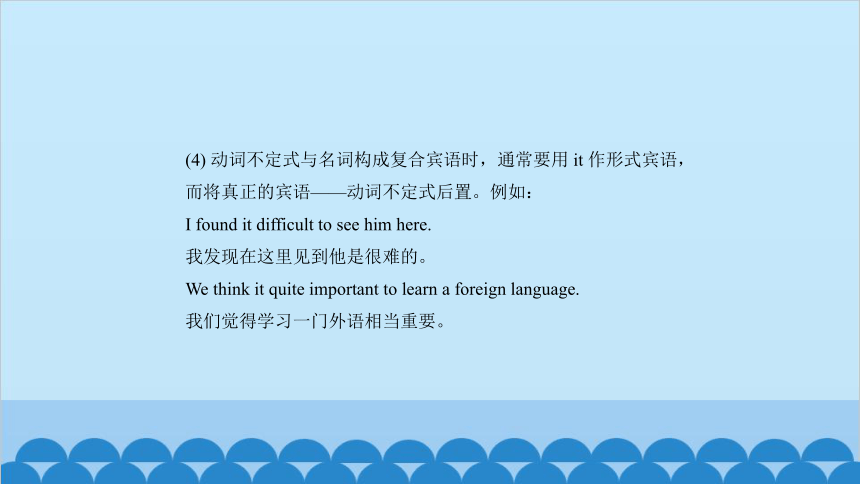
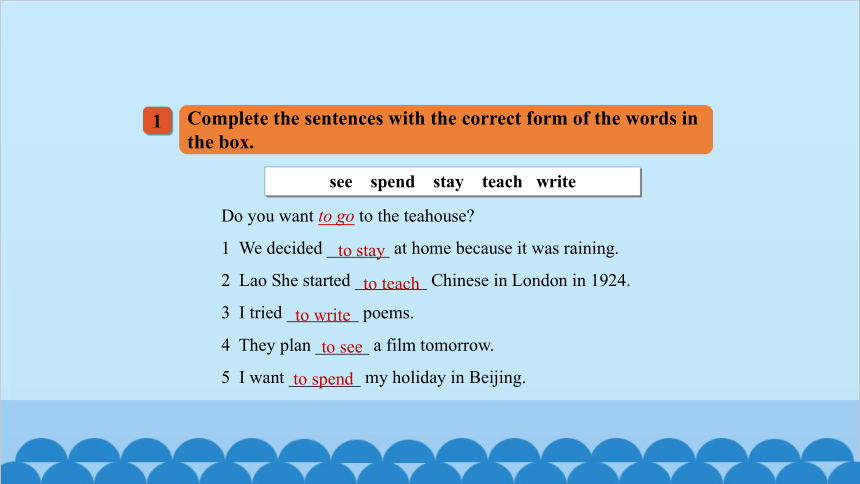
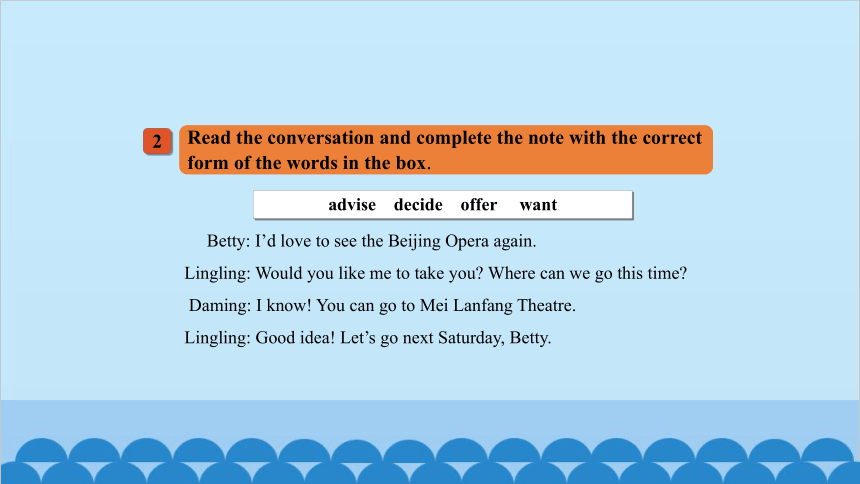
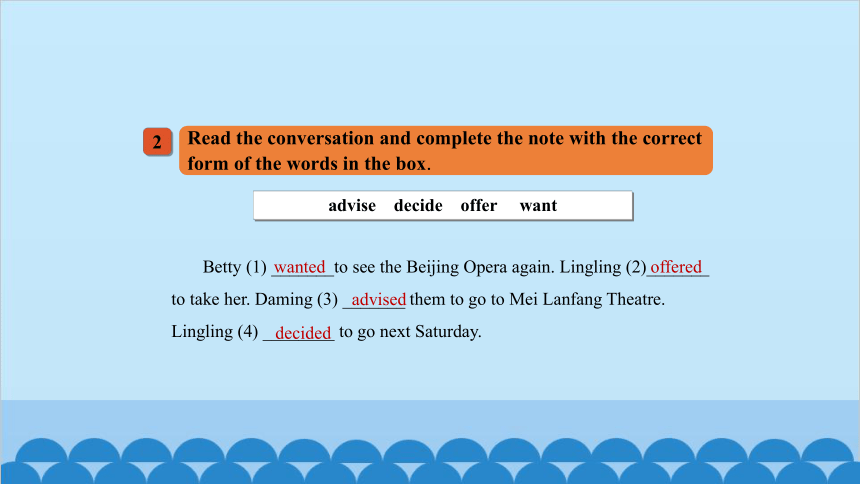
文档简介
(共32张PPT)
Module 5 Lao She Teahouse
Unit 3 Language in use
1. I wanted to see the Beijing Opera.
2. Lingling offered to take me there.
3. We only planned to watch for an hour.
4. I hope to understand more next time.
Observe the usage below and try to find more verbs like this.
Language practice
want to do sth.
offer to do sth.
decide to do sth.
remember to do sth.
1. 想要做某事
2. 提议做某事
3. 决定做某事
4. 记着要做某事
More verbs with “to do” forms.
5. 忘记要做某事
6. 停下来去做某事
7. 同意做某事
8. 希望做某事
9. 喜欢做某事
forget to do sth.
stop to do sth.
agree to do sth.
hope to do sth.
like to do sth.
More verbs with “to do” forms.
Read page 126 of the textbook and answer the following questions in 5 minutes.
1. 何为动词不定式?
2. 动词不定式可在句子中作什么成分?
3. 常接动词不定式作宾语的动词有哪些?
Learn by yourselves and talk about it in groups.
Ⅰ. 动词不定式
动词不定式是由“____________”构成 (有时可以不带to)。其否定形式是“_______________”(not不与助动词连用)。它属于一种非谓语动词形式,在句中_____(能,不能) 充当谓语,_____(有,没有)人称和数的变化,但它可以保留动词的性质,其本身可以带宾语或状语等附加成分(不定式和其附加成分称为不定式短语)。
没有
1. 概述
不能
to+动词原形
not+动词不定式
(1)动词不定式(短语)的句法功能非常广泛,在句中可作主语、宾语、补足语、表语、定语及状语等成分。表示的多为______ 行为。
(2)能够接动词不定式作宾语的有 ask, agree, beg, decide, fail, hope, offer, plan, promise, refuse, wish 及 would like/love 等动词。
2. 句法功能
将来
(3)某些动词如finish, enjoy, miss, practise, mind, advise, suggest 等后面通常只能接动名词作宾语。
e.g. She has to finish reading the book before 5.
她得在五点之前读完这本书。
She enjoys reading very much.
她非常喜欢读书。
Would you mind answering the door for me
你能帮我应一下门吗?
(4) 动词不定式与名词构成复合宾语时,通常要用 it 作形式宾语,而将真正的宾语——动词不定式后置。例如:
I found it difficult to see him here.
我发现在这里见到他是很难的。
We think it quite important to learn a foreign language.
我们觉得学习一门外语相当重要。
Do you want to go to the teahouse
1 We decided _______ at home because it was raining.
2 Lao She started ________ Chinese in London in 1924.
3 I tried ________ poems.
4 They plan ______ a film tomorrow.
5 I want ________ my holiday in Beijing.
see spend stay teach write
to stay
to teach
to write
to see
to spend
1
Complete the sentences with the correct form of the words in
the box.
advise decide offer want
Betty: I’d love to see the Beijing Opera again.
Lingling: Would you like me to take you Where can we go this time
Daming: I know! You can go to Mei Lanfang Theatre.
Lingling: Good idea! Let’s go next Saturday, Betty.
2
Read the conversation and complete the note with the correct
form of the words in the box.
Betty (1) _______to see the Beijing Opera again. Lingling (2)_______
to take her. Daming (3) _______ them to go to Mei Lanfang Theatre.
Lingling (4) ________ to go next Saturday.
wanted
offered
advised
decided
advise decide offer want
2
Read the conversation and complete the note with the correct
form of the words in the box.
Lu Xun is one of the greatest writers of modern China. He was born in
Shaoxing, Zhejiang Province, in 1881. At first, Lu Xun hoped (1) _______
(help) the Chinese people become healthy and strong, so he decided (2)_____
(be) a doctor. After a few years, he started (3) _______ (write) short stories
because he wanted (4)_______ (teach) people about society. One of his most
famous stories is The True Story of Ah Q. It describes the hard life of Ah Q
and makes people (5) _____ (think) about society. In the 1920s, people began
to translate his works into English.
to help
to be
to write
to teach
think
3
Complete the passage with the correct form of the words in
brackets.
Read page 127 of the textbook and answer the following questions in 5 minutes.
1. 何为双宾语?
2. 常跟双宾语的动词有哪些?
II. 双宾语
Learn by yourselves and talk about it in groups.
当我们表达“给某人某物”时就出现了两个动作的承受者,一个是物,一个是人,句中动词后面所接的就是双宾语。其中人为间接宾语,物为直接宾语。
例如:我哥哥给我买了一些书。
My brother bought me some books.
1. 概述
间接宾语可以前面加 to 或 for 表示动作的方向性。这时,间接宾语置于直接宾语之后。我们可以把上面例句改写为:
I passed him a bottle of apple juice.
采用了“动词+人+物”的表达方式。
间接宾语
直接宾语
2. 结构
I passed a bottle of apple juice to him.
采用了“动词+物+人”的表达方式。
直接宾语
间接宾语
3. 常用词
可以接双宾语的动词很多,常用的结构有:
cook sb. sth. = cook sth. for sb. send sb. sth.= send sth. to sb.
give sb. sth. = give sth. to sb. show sb. sth. = show sth. to sb.
lend sb. sth. = lend sth. to sb. teach sb. sth.= teach sth. to sb.
make sb. sth. = make sth. for sb.
例如:
My uncle gave me a pretty birthday present.
我叔叔给了我一个漂亮的生日礼物。
Waiters bring tea to the customers. 服务员给顾客上茶。
同义句转换。
1. Jim showed his classmates some beautiful photos.
Jim showed some beautiful photos ____ his classmates.
2. Mrs Wang taught an English song to us yesterday.
Mrs Wang taught _____ ____ ________ ______ yesterday.
3. Tony’s mother made a birthday cake for him.
Tony’s mother _____ ____ ___ ________ ______.
4. Can you pass me that pencil
Can you ______ ______ ________ ___ ___
5. Who teaches you Maths
Who ________ ________ ____ ____
to
us
an
English
song
made
him
a
birthday
cake
pass
that
pencil
to
me
to
teaches
Maths
you
1 Who is visiting London
a) Vicky b) Steve c) Romeo
2 What are they talking about
a) Romeo and Juliet. b) London. c) Vicky’s parents.
5
Listen and choose the correct answer.
1 Steve went to Shakespeare’s Globe Theatre last night.
2 Vicky offered to take Steve to the theatre.
3 Steve did not try to understand the words.
4 Vicky hopes to see her favourite play.
5 Vicky thinks her parents will take her to the theatre.
6
Listen again and check (√) the true sentences.
√
√
√
Vicky: Hello, Steve. Are you enjoying your visit to London
Steve: Thank you for asking, Vicky. I’m having a great time. We went to Shakespeare’s
Globe Theatre last night.
Vicky: Oh yes, it’s great. A lot of tourists want to go there.
Steve: Yes, my uncle offered to take us, and we decided to see Romeo and Juliet.
Vicky: Did you understand the play
Steve: Well, I tried to understand the words. It was very difficult. But I know the story.
Vicky: I hope to see Romeo and Juliet too. It’s my favourite play.
Steve: Will your parents agree to take you
Vicky: Yes, I’m sure they will.
Tapescript:
— I want to see the Beijing Opera
— Why don’t we…
hope how about let’s want
why don’t we why not would like
7
Work in pairs. Talk about your weekend plans. Use the words
and expressions in the box to help you.
Review of Teahouse
By Li Daming
This year's school play was a very good choice. Teahouse, by Lao She, is famous and interesting. We learnt a lot about people's lives in China some one hundred years ago. The actors’ and actresses' clothes and the teahouse furniture were right for the first half of the twentieth century. The actors and actresses all did a very good job. Li Nan, the student playing Wang Lifa, the owner of the teahouse, was the best. He brought Wang Lifa to life, from a young man to an old man.
I had a great time at the theatre. It was easy for everyone to understand the story and see the changes in Chinese society.
8
Read the passage and choose the correct answer.
1 You would find the passage in ________.
a) a book b) a school newspaper c) a magazine
2 The writer _________.
a) liked the play b) did not like the play
c) did not say he liked the play or not
3 The actors and actresses in the play wore ________.
a) the same clothes as today b) their best clothes
c) clothes of the first half of the twentieth century
4 Li Nan is _________.
a) a famous actor b) a student c) an actress
8
Read the passage and choose the correct answer.
本年度的学校戏剧是个很好的选择。由老舍写的《茶馆》很出名也很有趣。
我们了解了很多约100年前中国人的生活。男女演员的服装和茶馆里的摆设都符合二十世纪上半叶的情况。男女演员都表现得相当出色。李楠,扮演茶馆老板王利发的学生,是最出色的。他把从青年到老年的王利发演得栩栩如生。我在剧院过得很愉快。大家很容易理解这个故事而且很容易看到中国社会的变迁。
参考译文
Western theatre started in Greece, around 600 BC. The theatres were very big. About 15,000 people could watch a play at the same time. The audience sat on stone seats to watch the performances. Some of the theatres survive, as do some of the plays by ancient Greek writers. People still watch these plays today.
Around the world
Ⅰ. 根据句意及汉语提示完成单词
1. They______ (计划) to buy the new house.
2. Tom wants to be an________ (演员).
3. My favourite ________ (小说) is Romance of the Three Kingdoms.
4. At last the old man can’t find any ________ (金子) in the field.
5. The old man did good things to pay back ________ (社会).
plan
actor
novel
gold
society
Ⅱ. 用所给词的适当形式填空
1. The boy offered __________ (help) the old man in trouble.
2. We tried ___________ (understand) the new words.
3. Vicky hopes _______ (see) her favourite play.
4. The movie makes us __________ (think) about our environment.
5. After a few years, he started __________ (write) short stories.
to help
to understand
to see
to think
to write
Ⅲ.单项选择
1. They ______ him a job in the company, but he refused(拒绝).
A. offered B. took C. showed D. gave
2. A group of Class 3 students decided ______ to the museum in the centre of the town.
A. go B. to go C. went D. going
3. Steve tried ______ the words.
A. understand B. to understand C. understanding D. understands
4. The little girl quickly became ______ and sat down to rest.
A. tire B. tiring C. tired D. more tired
5. —Did you go to the theatre to see the performance last night
—No, my parents asked me ______ painting at home.
A. practice B. practiced C. practicing D. to practice
Ⅳ. 完成句子
1. 这个故事发生在1952年的中国。
The story _____ ______ in China in 1952.
2. 我决定第二天去游泳。
I decided ___ ___ _______ the next day.
3. 鲁迅是20世纪中国最著名的作家之一吗
Was Lu Xun one of ____ ________ Chinese ________ of the ________ century
4. 最后他找到了他丢失的孩子。
___ ___ ____ he found his lost child.
5. 我的叔叔在一所大学里教法语。
My uncle taught French ___ __ _______.
took place
to go swim
the greatest
writers
twentieth
At the end
in a college
1. Finish exercise 4 on page 39 of the textbook.
2. Choose one scene of a play and write it in English. You can show it to
your classmates next time. Try to think about these questions:
(1)Where does it take place
(2)Who is in it
(3)What is the story
(4)What are the special moments in it
Thanks for listening!
Module 5 Lao She Teahouse
Unit 3 Language in use
1. I wanted to see the Beijing Opera.
2. Lingling offered to take me there.
3. We only planned to watch for an hour.
4. I hope to understand more next time.
Observe the usage below and try to find more verbs like this.
Language practice
want to do sth.
offer to do sth.
decide to do sth.
remember to do sth.
1. 想要做某事
2. 提议做某事
3. 决定做某事
4. 记着要做某事
More verbs with “to do” forms.
5. 忘记要做某事
6. 停下来去做某事
7. 同意做某事
8. 希望做某事
9. 喜欢做某事
forget to do sth.
stop to do sth.
agree to do sth.
hope to do sth.
like to do sth.
More verbs with “to do” forms.
Read page 126 of the textbook and answer the following questions in 5 minutes.
1. 何为动词不定式?
2. 动词不定式可在句子中作什么成分?
3. 常接动词不定式作宾语的动词有哪些?
Learn by yourselves and talk about it in groups.
Ⅰ. 动词不定式
动词不定式是由“____________”构成 (有时可以不带to)。其否定形式是“_______________”(not不与助动词连用)。它属于一种非谓语动词形式,在句中_____(能,不能) 充当谓语,_____(有,没有)人称和数的变化,但它可以保留动词的性质,其本身可以带宾语或状语等附加成分(不定式和其附加成分称为不定式短语)。
没有
1. 概述
不能
to+动词原形
not+动词不定式
(1)动词不定式(短语)的句法功能非常广泛,在句中可作主语、宾语、补足语、表语、定语及状语等成分。表示的多为______ 行为。
(2)能够接动词不定式作宾语的有 ask, agree, beg, decide, fail, hope, offer, plan, promise, refuse, wish 及 would like/love 等动词。
2. 句法功能
将来
(3)某些动词如finish, enjoy, miss, practise, mind, advise, suggest 等后面通常只能接动名词作宾语。
e.g. She has to finish reading the book before 5.
她得在五点之前读完这本书。
She enjoys reading very much.
她非常喜欢读书。
Would you mind answering the door for me
你能帮我应一下门吗?
(4) 动词不定式与名词构成复合宾语时,通常要用 it 作形式宾语,而将真正的宾语——动词不定式后置。例如:
I found it difficult to see him here.
我发现在这里见到他是很难的。
We think it quite important to learn a foreign language.
我们觉得学习一门外语相当重要。
Do you want to go to the teahouse
1 We decided _______ at home because it was raining.
2 Lao She started ________ Chinese in London in 1924.
3 I tried ________ poems.
4 They plan ______ a film tomorrow.
5 I want ________ my holiday in Beijing.
see spend stay teach write
to stay
to teach
to write
to see
to spend
1
Complete the sentences with the correct form of the words in
the box.
advise decide offer want
Betty: I’d love to see the Beijing Opera again.
Lingling: Would you like me to take you Where can we go this time
Daming: I know! You can go to Mei Lanfang Theatre.
Lingling: Good idea! Let’s go next Saturday, Betty.
2
Read the conversation and complete the note with the correct
form of the words in the box.
Betty (1) _______to see the Beijing Opera again. Lingling (2)_______
to take her. Daming (3) _______ them to go to Mei Lanfang Theatre.
Lingling (4) ________ to go next Saturday.
wanted
offered
advised
decided
advise decide offer want
2
Read the conversation and complete the note with the correct
form of the words in the box.
Lu Xun is one of the greatest writers of modern China. He was born in
Shaoxing, Zhejiang Province, in 1881. At first, Lu Xun hoped (1) _______
(help) the Chinese people become healthy and strong, so he decided (2)_____
(be) a doctor. After a few years, he started (3) _______ (write) short stories
because he wanted (4)_______ (teach) people about society. One of his most
famous stories is The True Story of Ah Q. It describes the hard life of Ah Q
and makes people (5) _____ (think) about society. In the 1920s, people began
to translate his works into English.
to help
to be
to write
to teach
think
3
Complete the passage with the correct form of the words in
brackets.
Read page 127 of the textbook and answer the following questions in 5 minutes.
1. 何为双宾语?
2. 常跟双宾语的动词有哪些?
II. 双宾语
Learn by yourselves and talk about it in groups.
当我们表达“给某人某物”时就出现了两个动作的承受者,一个是物,一个是人,句中动词后面所接的就是双宾语。其中人为间接宾语,物为直接宾语。
例如:我哥哥给我买了一些书。
My brother bought me some books.
1. 概述
间接宾语可以前面加 to 或 for 表示动作的方向性。这时,间接宾语置于直接宾语之后。我们可以把上面例句改写为:
I passed him a bottle of apple juice.
采用了“动词+人+物”的表达方式。
间接宾语
直接宾语
2. 结构
I passed a bottle of apple juice to him.
采用了“动词+物+人”的表达方式。
直接宾语
间接宾语
3. 常用词
可以接双宾语的动词很多,常用的结构有:
cook sb. sth. = cook sth. for sb. send sb. sth.= send sth. to sb.
give sb. sth. = give sth. to sb. show sb. sth. = show sth. to sb.
lend sb. sth. = lend sth. to sb. teach sb. sth.= teach sth. to sb.
make sb. sth. = make sth. for sb.
例如:
My uncle gave me a pretty birthday present.
我叔叔给了我一个漂亮的生日礼物。
Waiters bring tea to the customers. 服务员给顾客上茶。
同义句转换。
1. Jim showed his classmates some beautiful photos.
Jim showed some beautiful photos ____ his classmates.
2. Mrs Wang taught an English song to us yesterday.
Mrs Wang taught _____ ____ ________ ______ yesterday.
3. Tony’s mother made a birthday cake for him.
Tony’s mother _____ ____ ___ ________ ______.
4. Can you pass me that pencil
Can you ______ ______ ________ ___ ___
5. Who teaches you Maths
Who ________ ________ ____ ____
to
us
an
English
song
made
him
a
birthday
cake
pass
that
pencil
to
me
to
teaches
Maths
you
1 Who is visiting London
a) Vicky b) Steve c) Romeo
2 What are they talking about
a) Romeo and Juliet. b) London. c) Vicky’s parents.
5
Listen and choose the correct answer.
1 Steve went to Shakespeare’s Globe Theatre last night.
2 Vicky offered to take Steve to the theatre.
3 Steve did not try to understand the words.
4 Vicky hopes to see her favourite play.
5 Vicky thinks her parents will take her to the theatre.
6
Listen again and check (√) the true sentences.
√
√
√
Vicky: Hello, Steve. Are you enjoying your visit to London
Steve: Thank you for asking, Vicky. I’m having a great time. We went to Shakespeare’s
Globe Theatre last night.
Vicky: Oh yes, it’s great. A lot of tourists want to go there.
Steve: Yes, my uncle offered to take us, and we decided to see Romeo and Juliet.
Vicky: Did you understand the play
Steve: Well, I tried to understand the words. It was very difficult. But I know the story.
Vicky: I hope to see Romeo and Juliet too. It’s my favourite play.
Steve: Will your parents agree to take you
Vicky: Yes, I’m sure they will.
Tapescript:
— I want to see the Beijing Opera
— Why don’t we…
hope how about let’s want
why don’t we why not would like
7
Work in pairs. Talk about your weekend plans. Use the words
and expressions in the box to help you.
Review of Teahouse
By Li Daming
This year's school play was a very good choice. Teahouse, by Lao She, is famous and interesting. We learnt a lot about people's lives in China some one hundred years ago. The actors’ and actresses' clothes and the teahouse furniture were right for the first half of the twentieth century. The actors and actresses all did a very good job. Li Nan, the student playing Wang Lifa, the owner of the teahouse, was the best. He brought Wang Lifa to life, from a young man to an old man.
I had a great time at the theatre. It was easy for everyone to understand the story and see the changes in Chinese society.
8
Read the passage and choose the correct answer.
1 You would find the passage in ________.
a) a book b) a school newspaper c) a magazine
2 The writer _________.
a) liked the play b) did not like the play
c) did not say he liked the play or not
3 The actors and actresses in the play wore ________.
a) the same clothes as today b) their best clothes
c) clothes of the first half of the twentieth century
4 Li Nan is _________.
a) a famous actor b) a student c) an actress
8
Read the passage and choose the correct answer.
本年度的学校戏剧是个很好的选择。由老舍写的《茶馆》很出名也很有趣。
我们了解了很多约100年前中国人的生活。男女演员的服装和茶馆里的摆设都符合二十世纪上半叶的情况。男女演员都表现得相当出色。李楠,扮演茶馆老板王利发的学生,是最出色的。他把从青年到老年的王利发演得栩栩如生。我在剧院过得很愉快。大家很容易理解这个故事而且很容易看到中国社会的变迁。
参考译文
Western theatre started in Greece, around 600 BC. The theatres were very big. About 15,000 people could watch a play at the same time. The audience sat on stone seats to watch the performances. Some of the theatres survive, as do some of the plays by ancient Greek writers. People still watch these plays today.
Around the world
Ⅰ. 根据句意及汉语提示完成单词
1. They______ (计划) to buy the new house.
2. Tom wants to be an________ (演员).
3. My favourite ________ (小说) is Romance of the Three Kingdoms.
4. At last the old man can’t find any ________ (金子) in the field.
5. The old man did good things to pay back ________ (社会).
plan
actor
novel
gold
society
Ⅱ. 用所给词的适当形式填空
1. The boy offered __________ (help) the old man in trouble.
2. We tried ___________ (understand) the new words.
3. Vicky hopes _______ (see) her favourite play.
4. The movie makes us __________ (think) about our environment.
5. After a few years, he started __________ (write) short stories.
to help
to understand
to see
to think
to write
Ⅲ.单项选择
1. They ______ him a job in the company, but he refused(拒绝).
A. offered B. took C. showed D. gave
2. A group of Class 3 students decided ______ to the museum in the centre of the town.
A. go B. to go C. went D. going
3. Steve tried ______ the words.
A. understand B. to understand C. understanding D. understands
4. The little girl quickly became ______ and sat down to rest.
A. tire B. tiring C. tired D. more tired
5. —Did you go to the theatre to see the performance last night
—No, my parents asked me ______ painting at home.
A. practice B. practiced C. practicing D. to practice
Ⅳ. 完成句子
1. 这个故事发生在1952年的中国。
The story _____ ______ in China in 1952.
2. 我决定第二天去游泳。
I decided ___ ___ _______ the next day.
3. 鲁迅是20世纪中国最著名的作家之一吗
Was Lu Xun one of ____ ________ Chinese ________ of the ________ century
4. 最后他找到了他丢失的孩子。
___ ___ ____ he found his lost child.
5. 我的叔叔在一所大学里教法语。
My uncle taught French ___ __ _______.
took place
to go swim
the greatest
writers
twentieth
At the end
in a college
1. Finish exercise 4 on page 39 of the textbook.
2. Choose one scene of a play and write it in English. You can show it to
your classmates next time. Try to think about these questions:
(1)Where does it take place
(2)Who is in it
(3)What is the story
(4)What are the special moments in it
Thanks for listening!
同课章节目录
- Module 1 How to learn English
- Unit 1 Let's try to speak English as much as possi
- Unit 2 You should smile at her.
- Unit 3 Language in use .
- Module 2 My home town and my country
- Unit 1 It's taller than many other buildings.
- Unit 2 Cambridge is a beautiful city in the east o
- Unit 3 Language in use .
- Module 3 Sports.
- Unit 1 Nothing is more exciting than playing tenni
- Unit 2 This year we training more carefully.
- Unit 3 Language in use .
- Module 4 Planes, ships and trains .
- Unit 1 He lives the farthest from school.
- Unit 2 What is the best way to travel.
- Unit 3 Language in use .
- Module 5 Lao She Teahouse.
- Unit 1 I wanted to see the Beijing Opera.
- Unit 2 It descibes the changes in Chinese society.
- Unit 3 Language in use .
- Module 6 Animals in danger.
- Unit 1 It allows people to get closer to them .
- Unit 2 The WWF is working hard to save them all.
- Unit 3 Language in use .
- Revision module A
- Module 7 A famous story
- Unit 1 Alice was sitting with her sister by the ri
- Unit 2 She was thinking about her cat.
- Unit 3 Language in use .
- Module 8 Accidents
- Unit 1 While the car were changing to red, a car s
- Unit 2 I was trying to pick it up when it bite me
- Unit 3 Language in use .
- Module 9 Population
- Unit 1 The population of China is about 1.37 billi
- Unit 2 Arnwick was a city with 200,000 people.
- Unit 3 Language in use .
- Module 10 The weathe
- Unit 1 It might snow.
- Unit 2 The weather is fine all year round.
- Unit 3 Language in use .
- Module 11 Way of life
- Unit 1 In China ,we open a gift later.
- Unit 2 In England, you usually drink tea with milk
- Unit 3 Language in use .
- Module 12 Help
- Unit 1 What should we do before help arrives?
- Unit 2 Stay away from windows and heavy furniture.
- Unit 3 Language in use .
- Revision module B
